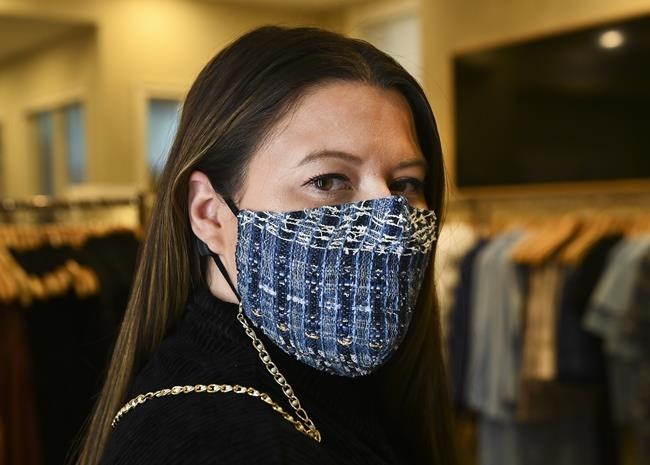TORONTO — When COVID-19 began spreading across Canada and face masks became the year’s hottest fashion accessory, Hilary MacMillan uncovered an opportunity.
The Toronto fashion designer noticed people wanted a way to make their masks trendy and keep them handy when having to take them off for a bite to eat, so she joined the waves of retailers selling mask chains — 70-centimetre lengths of marble or gold that MacMillan has designed to hang from masks and provide a hint of style.
"COVID has kind of pushed everyone into new directions and that's the same with us," said MacMillan.
Her $25 mask chains are part of a growing group of products entrepreneurs have dreamed up to target just about every mask-related want, need or problem.
Can’t stop your mask from irritating your nose or ears? There are headbands, ear muffs and hats to attach the straps to, soft pads you can add to problem spots and clips to keep masks in place.
Is covering up causing you to break out in maskne (mask-induced acne)? Look out for sheet masks, cleansers and moisturizers targeted at the lower half of your face.
Not sure where to put your mask when dining out or at the dentist? Consider pouches, bags and containers in just about every size and material.
If you’re sporting facial hair, there are beard guards that fit with masks and if you wear glasses, sprays and lenses that promise to reduce or eliminate fog too.
"You're literally watching a product category be born and it's going to grow," said Joanne McNeish, an associate professor at Ryerson University specializing in marketing.
There's plenty of money to be made in the new market, she said, because people are realizing masks are going to be part of their lives for longer than they imagined, and while out in public they're stumbling on problems like chafed noses or the need for storage space.
Just 15 per cent of face masks being sold are described as comfortable, 6 per cent are marketed as breathable and 7 per cent are called lightweight, according to research from U.K.-based retail market intelligence company Edited.
Entrepreneurs who can address such problems and predict that unmet need early stand to win, said McNeish.
However, health experts caution that not all of these innovations are a good idea.
Dr. Vinita Dubey, Toronto Public Health's associate medical officer of health, said in an email to The Canadian Press that she does not recommend mask lanyards or chains because they can get caught around the wearer's neck or become contaminated.
People who need to take face coverings off, she said, should store them in a paper bag, envelope or something that does not retain moisture. Plastic bags should only be used for short periods of time and containers must be disinfected regularly.
Regardless of whether an item is encouraged by public health officials, McNeish says entrepreneurs face the challenge of waning interest.
The marketplace can become crowded with similar products and some businesses may create far superior products than what was first available.
"And how many of each of these things will you really need?" she added.
McNeish believes the next wave of mask accessories will involve products that work with Halloween costumes, helmets for winter sports and scarves or that take items that have proven to be hits and make them luxurious or adaptable for health-care workers or other industries.
In Dunmore, Alta., Rick Brink has been using that logic to appeal to brides and grooms.
He runs Weddingstar Inc., a business specializing in bridal products that sells mask travel bags, headbands to hook masks on and a plastic piece you attach to the straps of a mask to prevent ear chafe.
"We wanted to make them so everyone doesn't look like they are walking out of the hospital," he said.
The products are appealing to shoppers beyond the wedding market and help the company offset smaller order sizes now that weddings must limit attendees and many couples have put off their nuptials altogether.
Next, Brink said, he will introduce products that help people defog glasses and keep makeup from rubbing off on masks.
While companies are seeing a buzz around their mask accessories now, McNeish warns that it might not last forever.
"At one point when masks are over, the mask accessories industry will collapse because it just won't be strong enough," she said.
"Then the question will be will there be demand in countries where they wear masks all the time and will we continue to wear masks when they tell us this is over?"
This report by The Canadian Press was first published Nov. 15, 2020.
Tara Deschamps, The Canadian Press



